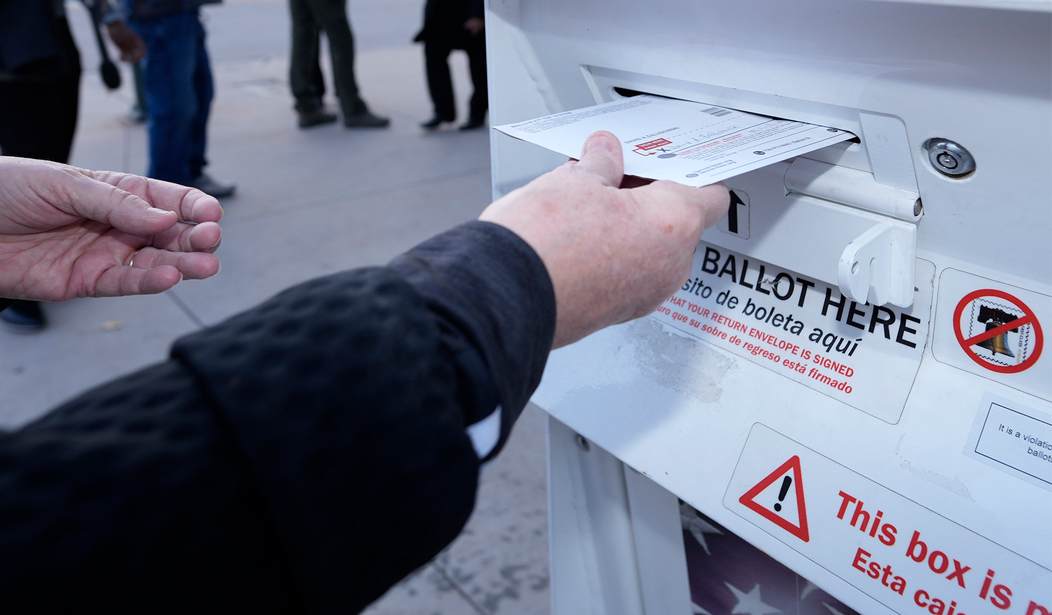As RedState’s Managing Editor Jennifer Van Laar reported last week, the United States Ninth Circuit Court of Appeals has given the green light to the lawsuit filed by the Election Integrity Project of California challenging the constitutionality of California’s election laws.
From The California Globe:
The Ninth Circuit has ruled that Election Integrity Project®California (EIPCa) and recent and future congressional candidates have standing to challenge the Constitutionality of California’s election laws, regulations, policies and procedures that have weakened or removed integrity from the election process. Though the Constitution gives authority to state legislators to pass laws to manage elections and process ballots, EIPCa asserts they do not have carte blanche authority to pass laws that diminish the value of the lawfully cast ballots.
These laws, orders and regulations culminated “in the 2020 election, when Governor Newsom authorized mailing a ballot to all ‘active’ registrants on the voter rolls and former Secretary of State Alex Padilla gutted signature verification requirements. EIPCa received over 700 affidavits signed under penalty of perjury from EIPCa-trained observers who consistently reported election workers not adequately verifying signatures and, in some cases, counting ballots without signatures.”
I reported in June of 2021 on the initial EIPCa filing to the Ninth Circuit.
EIPCa is joined in the lawsuit by 13 California Congressional candidates: James P. Bradley, Aja Smith, Eric Early, Alison Hayden, Jeffrey Gorman, Mark Reed, Buzz Patterson, Mike Cargile, Kevin Cookingham, Greg Raths, Chris Bish, Ronda Kennedy, and Johnny Nalbandian. In November of 2020, these candidates ran for seats in the United States House of Representatives, and EIPCa discovered substantial irregularities and documented apparent fraud in these candidate’s districts.
RedState’s own Buzz Patterson, who ran in 2020 for California District 7, is a plaintiff in the lawsuit and described why he chose to sign on:
“We sued several counties in California for visibility and retaining records. Some counties dumped the results [of the 2020 election] immediately. It’s a gray area, and California law allows for it. Most counties have retained their records,” he said.
“[We just have these questions and want transparency] How are you guys counting this stuff? How do you do your signature verification in a country where people have a hard time writing cursive?
“[EIPCa] are making gains, and I think the Ninth Circuit decision was huge. Because we may make it to the Supreme Court. That is the ultimate goal.”
The EIPCa said in its statement:
“Because neither the state legislature nor Alex Padilla required uniform and secure vote casting and counting procedures, uneven procedures were applied across counties. EIPCa and its co-plaintiffs filed this lawsuit against Governor Newsom, the Attorney General, the Secretary of State, and thirteen county registrars.
“This lawsuit is monumental because it is the first to challenge the constitutionality of California’s election laws and procedures, and we are the first to get past standing,” says Mariah Gondeiro, the lead attorney who works for Advocates for Faith and Freedom. “If we win, California will be required to enforce secure and uniform vote casting and vote counting procedures.”
Patterson pointed out the genius of the EIPCa’s and their attorney’s approach. This direction is probably what helped secure the Ninth Circuit’s affirmative ruling:
“We’ve got issues in California, Arizona, other places in this nation. What Linda [Paine of EIPCa] and her team are doing is just great,” Patterson said.
“The nature of the lawsuit is unmask the process. It’s not about changing the results of any one election, it’s about ALL elections and how an unexamined process destroys the integrity and honor of the vote for every citizen.
“It’s not trying to go back and overturn anything. Nobody is challenging the results of 2020 or 2022. That’s not what this lawsuit is about. It’s about visibility. When you go to the polls your vote should count and it’s not going to be diminished in any way, shape, or form. Linda and her team are hashing out how do we make this better going forward.”
While Patterson has not decided on a future run, the outcome of this lawsuit, and the continued focus on shoring up election integrity, will be critical for any congressional race in the future.
“This is my concern: Having run myself in 2020, and I know Aja [Smith in CA 39] and Chris [Bish in CA 06] just ran in 2022. I might do it in the future,” Patterson said.
“We have to stay on this, because it literally does take four years, even eight years to get people to pay attention to the fact that we have an election integrity problem.”
Just days after the Ninth Circuit decision, Arizona Republican gubernatorial candidate Kari Lake filed a lawsuit against Maricopa County elections officials, claiming that they willfully broke election laws and that the printer issues in polling places extended across the county to 118 polling centers. Despite hours of public testimony against the certification of the election results, the county chose to unanimously certify the votes projecting Democrat Katie Hobbs as the winner. While this may facilitate the smooth transition of power and the operations of the state, this type of rush to wrap things up without a thorough investigation of problems within the electoral process has only served to erode, rather than strengthen, citizens’ confidence in the vote.
“We as a state, we as a nation need to figure out what’s going on with our elections,” Patterson said.
“Linda Paine is brilliant and she’s relentless.”
The fact that this lawsuit has moved forward is a significant step in seeing this come about.
From Monday’s Daily Signal:
The U.S. District Court for the Central District of California in Los Angeles soon will schedule a conference about when to proceed with discovery in the case, said Mariah Gondeiro, lead attorney for the plaintiffs. Gondeiro, who works for the nonprofit law firm Advocates for Faith and Freedom, said the plaintiffs are in the process of amending their complaint.
“A few of the key issues we are focusing on are vote-by-mail, the no uniform rules on signature verification, and poor maintenance of voter rolls,” Gondeiro told The Daily Signal. “California has expanded vote-by-mail and reduced signature verification, which makes no sense.”
This inconsistency across counties is an issue pointed out by both Aja Smith, who ran against Democrat Mark Takano for California 39, and Chris Bish who ran in California 6. Both are plaintiffs in the lawsuit, and both plan to run for office again. While federalism allows for different election processes across the country, across a state, it seems to breed more confusion, rather than less. So, in California, what is allowed in Ventura County, is not the same as what is allowed in Los Angeles County, or San Luis Obispo, or Sacramento, creating bottlenecks within the system.
“Well, they want to make it hard,” Bish confirmed.
“Like, Sacramento County, right? That’s where I’m going to focus. We’re at 400,000 ballots that have come in [as of November 23]. There’s still another 89,000 ballots that need to be counted, and they’re not going to give us an update until November 29th. They’re going to go a week with no update.”
Patterson made it plain that,
“It’s the leadership of each of the counties, they’re surprisingly different. It’s all based on the local leadership in that particular county. We got a lot of assistance from Fresno County, and some of the smaller counties. Sacramento, and Los Angeles County did not want to play ball at all, and were stonewalling the whole time.
“The big ones [counties] have been the most difficult to deal with. The Registrar-Recorder in Sacramento was polite, but not helpful. Other counties have been very forthcoming.”
Then there are the two largest counties, Riverside and Los Angeles, which still refuse to clear out the voter rolls.
“My main thing too, especially with my County of Riverside—’cause this is the second largest county in the state—is that we need to clean up the voter rolls,” Smith said.
“If you haven’t voted in the last five elections, you need to get scrubbed off and you need to re-register. And that is your duty. We really need to educate the public. Regardless of what you subscribe to for political ideology, you have a civic duty to make sure you’re registered in the right place. You’re registered in the right city and that your vote is sacred.”
Voter apathy has always been a distinctly California issue, and the 2022 midterms continue to reflect this. According to the California Secretary of State website, voter turnout for the 2022 Midterm General Election was 50.4 percent as of Wednesday, November 30. Out of the 39 million people in California, with over 21 million voters registered, that’s a little more than 10 million voters who either mailed in their ballot or showed up to vote at the polls.
Pathetic, and part and parcel of this is the sense that the vote does not matter; therefore, why should anyone bother?
A months-long vote-counting process does not help matters. California law now allows ballots to be postmarked until November 15—a full seven days after the November 8 General Election. Each County official (58 in all) must complete their certifications by December 8. The Secretary of State must certify the results on December 16. This process is not only disconnecting voters, but disenfranchising candidates, especially those in down-ballot races.
It is EIPCa’s and the plaintiffs’ goal that the voting process in the state is fully examined in order to remove any areas of fraud and disenfranchisement. More importantly, they want to see the vote and its importance in our representative republic returned to We the People.
“There’s nothing wrong with challenging results,” Patterson said.
“If you’re concerned or interested in how the process works, you’re an election denier. They just want you to shut up and go away. There’s nothing subversive about this. How do you receive the early voting? How do you verify the signatures? Are the Dominion machines plugged into the internet and how is that addressing security concerns?
“And that’s why we had to go to court. It’s a little bit suspicious to me that California allows our counties to not have to report for 30 days.”
Chris Bish agrees that too much time between when votes are cast and when they are counted deepens the suspicion and cements the apathy.
“Their vote doesn’t count, and they know.”
Smith added this perspective:
“And they’re scared to vote! But we want to tell people, Don’t be afraid. Just keep doing it. And volunteer—it’s long hours, but see the process at work.”
The Ninth Circuit has sent the suit back to the lower district court, so now begins the process of discovery. The hope is that Californians will get a full view of the underbelly of this process, for good, or for ill.
Bish sees this as an opportunity to reform the way elections are done in California, and looks to the example set by Florida as a goal to strive for.
“I’m hoping we go back to a system where people are involved. We watch the state of Florida, where they counted and called every race in a single night. And if we think about it, it wasn’t that long ago that we were doing this in California before we saw the bastardization of our election system.
“Regardless of what equipment they’re using, they’ve segregated us. Correct? Right? And that’s always bad. We need to go back to the hand counting, we need to go back to the smaller precincts where we, you know, where you’re voting in the garage at the neighbor’s house, where everybody knows each other, and where you have that tally and it keeps going up.”
Smith sees election reform as another bulwark against the push to nationalize the election process.
“Well, that’s where they’re going. That’s what they’re trying to push. Federalize everything. Get rid of the states, get rid of the local government,” Smith said.
“I’m going to say this, and you can put it on record. There’s Republicans who are pushing this too. All the hoops they want to create a progressive, one state solution. It’s not just one side that’s doing it, and it increases more and more every day. One side is what I call the propaganda media, while the other side is doing the backroom deals.”
The courts allowing the lid to be lifted off the election laws in California, a state that has perfected ways to disconnect the people from the process, is a good sign that these practices may have finally jumped the shark.
The discovery and deposition phase will tell the tale.















Join the conversation as a VIP Member